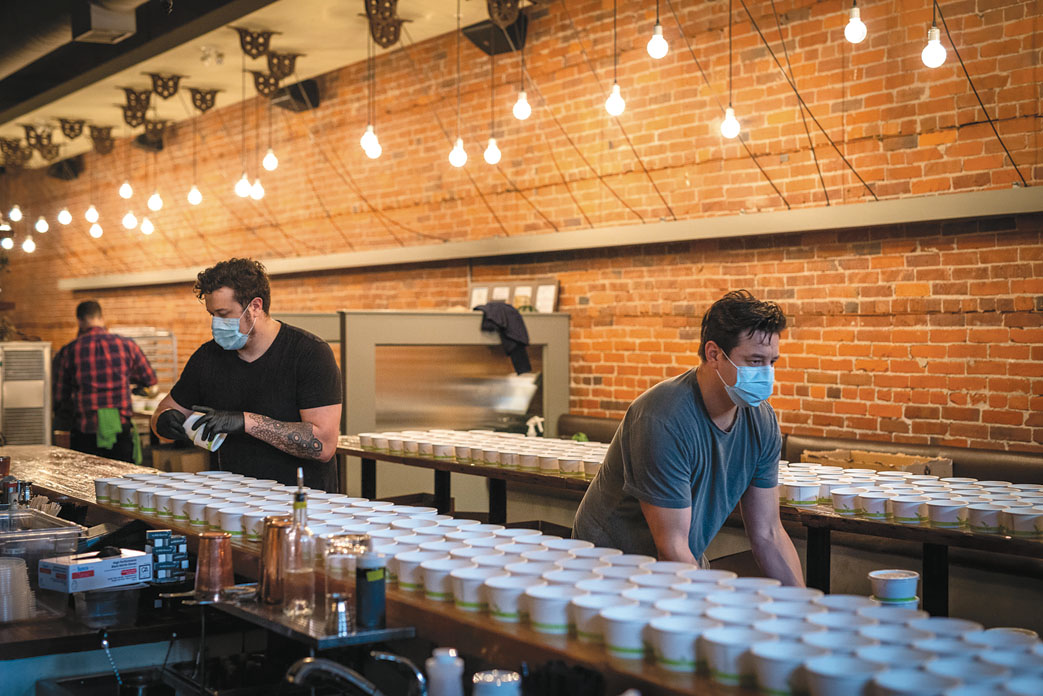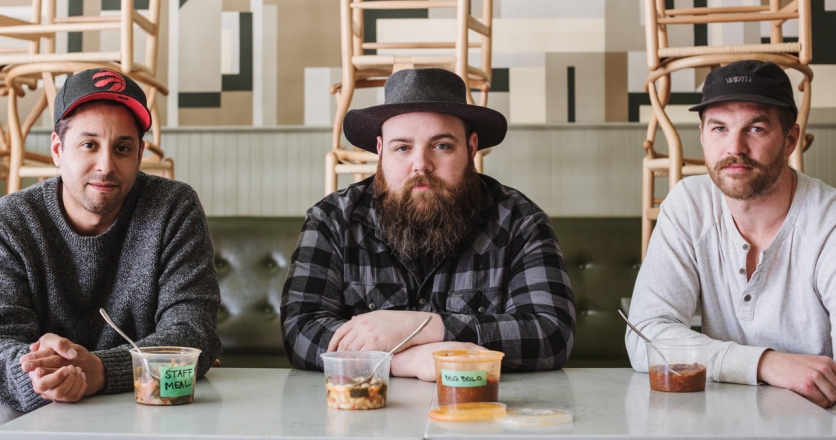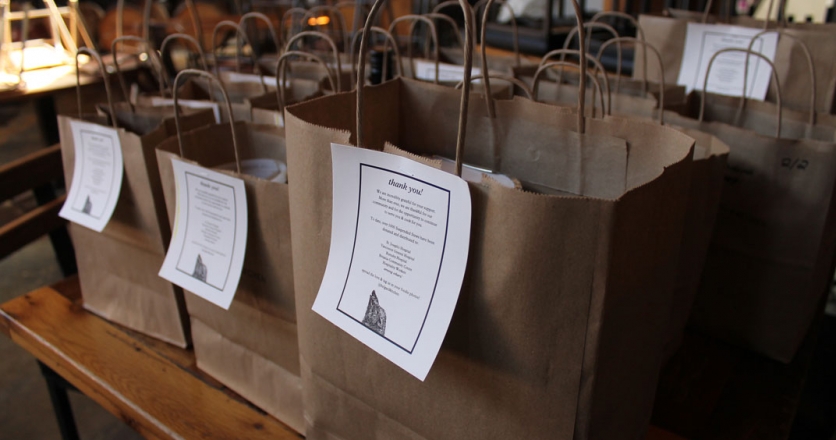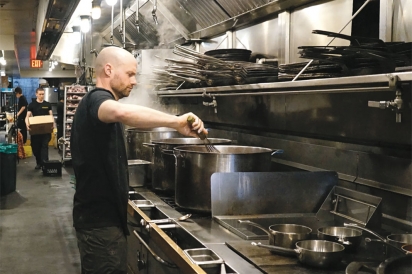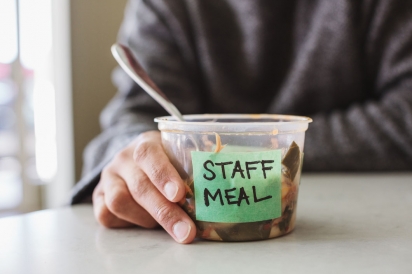Feeding a Community in Crisis
When Say Mercy restaurant opened in January 2020, Antonio Cayonne had no idea there was a crisis on the horizon. Restaurants are challenging businesses at the best of times, with thin profit margins and vulnerability to economic downturn. With those punishing realities, the industry exists because of the passionate people who run it. Cayonne, operations manager at Say Mercy, is no exception. When COVID-19 hit British Columbia in March, his restaurant group, Collective Hospitality, was forced to close to the public. Quickly, the owners developed a new goal: Feed those in need through a program they named Staff Meal.
“The premise of the restaurant was Italian through the lens of American barbecue,” Cayonne said of Say Mercy, the restaurant group’s second place. “It was a very smart, very busy, very exciting room to be in nightly, and the food was an experience that people had never had before — which was exciting for diners to make sense of on each visit and discover their newest craving.”
Then came coronavirus. Strict provincial health orders made restaurants close or move to takeout and delivery only.
“We saw that staying open was not the responsible thing to do, so on a sad Monday we closed both places and called all the staff to lay them off,” he says.
Soon, however, a new idea took hold. Since they could no longer pay their staff, the least they could do was continue to host their daily staff meal.
“Before a shift we sit together and eat, getting ready for service and checking in with one another,” he says. “We had kitchens full of food so why not? We then, as we do, extrapolated on that idea and considered the number of restaurants that would be closing and asked, could we feed them all?”
Then Cayonne and his team went a step further, aiming to help others as well. “We decided to put a menu together — unrelated to either restaurant’s cuisine — of healthy, affordable meals between $5 and $10 with the option to buy a meal on behalf of someone else, which we call a Suspended Stew. We quickly realized that due to the pandemic, many people would be in need, would be food insecure, and this would be a direct way to make sure we are making restaurant-quality food available to those in need. The Suspended Stews became something for more than just out-of-work restaurant workers: [They were] for anyone in need.”
The concept is simple. Customers can buy inexpensive meals for themselves and also Suspended Stews and Frontline Packages, the latter of which are purchases of food donated to the frontline workers of the customer’s choice. The restaurants have a daily allocation of places through the city to which they make food drops, based on need and capacity. These range from shelters to youth centres, clinics to hospitals, care homes for the elderly to church groups. Added to each order is a $2 donation for the Vancouver Food Bank.
Not only is this approach changing the company’s business model, it’s also forcing it to re-examine one’s whole raison-d’être. “We believe in the experience and power of true hospitality — curating experiences, taking care of other people. So when we knew restaurants had to close, the question was very clear: What does it mean to be ‘hospitable’ to our communities in a time of crisis?”
Cayonne soon realized that adding a couple of other options — meal kits for two and family meal kits for four-plus people — would help his restaurant stay afloat and help keep local suppliers afloat, too, until more government subsidies kicked in. Soon, he reached out to others in the restaurant business to see if they wanted to join in — some he knew, some he didn’t.
“People showed up because they shared a similar ethos and knew they wanted to do something to help the community, to help the staff they were laying off, and have purpose during a very difficult time.”
Joining forces
Reuben Major is one such restaurateur, who has joined forces with Cayonne to participate in the Staff Meal program. He has 25 years in the restaurant business under his belt with two wellestablished and much-loved Vancouver restaurants. His Belgard Kitchen, which opened in April 2014, includes Vancouver Urban Winery and Postmark Brewing. And Major’s group purchased Havana Restaurant in 2017 and gave it a renovation and brand update. “Two restaurants means double the stress right now,” Major says. “We had to lay off 70 employees.”
Major’s love of hospitality runs deep. “I love creating an environment where people feel relaxed; where they come to enjoy and unwind. I also love working with local suppliers and celebrating their hard work — putting it on a plate or in a glass.”
But these days his motivation has changed: “Now I’m driven to just try to exist on the other side of this. So many wonderful restaurants have already closed their doors for good. … I hope that once this is all over, people want to come to eat and drink at all of the independent restaurants. They help make up the dynamic fabric of our communities.”
Happily, the response to the Staff Meal program has been an outpouring of “overwhelming support, love and positivity” from the community, Cayonne reports.
Major agrees. “We are so humbled to see the response from our community — using us as a conduit to help those in need during such uncertainty has been amazing.”
Similar programs take root
Staff Meal isn’t the only restaurateur-led program aiming to help others. Karri Green-Schuermans is co-owner and founder of Chambar, co-founder of The Dirty Apron Cooking School, Delicatessen & Catering and Medina Café. Green- Schuermans and her business partner, chef Nico Schuermans, opened Chambar in 2004.
“We wanted to provide fine dining quality food and service, but without the pretension and elitism,” she says. “We wanted a raucous version, a place that was civilized debauchery, a place where you could come as a connoisseur or someone wanting to educate themselves about food and wine.”
When COVID-19 hit, Green-Schuermans spent days financially modelling their situation. “The numbers said shut the doors and likely close for good. We needed to innovate to survive. Take-out wouldn’t be enough, [so] we made prepared meals people could simply heat and serve that were delicious and nutritious. We distribute these through our website, Legends Haul and Spud.ca.”
But that wasn’t the end of the story, and inspiration came to Green-Schuermans in the form of a book called Braiding Sweetgrass by Robin Wall Kimmerer.
“The words ‘market economy’ and ‘giving economy’ jumped out at me. If we closed the doors, we would no longer have a platform to make change, to gift, to support, to create community, to envision a better world. Food security is a major issue — if borders closed, we would not have enough food. Having regional food security requires us to see its value and to support it.”
When they first closed, they had thousands of dollars in inventory that they needed to move or it would be wasted. They made it into meals their staff distributed to Oppenheimer Park and the Dugout Drop-In Centre. Since seniors were stuck inside and soup kitchens that help the poor were closed, there were vulnerable people to think about. That’s when Food Coalition was born.
“In moving from a market economy to a giving economy, we could provide a solution to three challenges,” Green- Schuermans further explains: “One, feed our most vulnerable citizens; two, strengthen our local food supply chain; and three, help restaurants bridge this time.”
Along the way, Green-Schuermans and her team have created community partnerships.
“We partnered with Foodee, which generously provided their app to centralize ordering and allow the City of Vancouver [another partner] to prioritize and order meals.”
Other partnerships include the Greater Vancouver Food Bank and Telus, the latter of which provides delivery service.
As with Staff Meal, the response to Food Coalition, which operates on a donation basis and can grant charitable receipts, has been overwhelmingly positive. In one month, Food Coalition raised $200,000 and that will translate into approximately 20,000 meals going to needy people. For the restaurants, it allows them to cover a small amount of labour, packaging and food costs.
“The community’s generosity in these times gives me hope in humanity. The Food Coalition only exists because of the generosity of the restaurant community, our guests, suppliers and companies who care.”
Trevor Bird, owner of the seasonally driven Fable restaurant in Kitsilano, is one of the restauranteurs taking part in the Food Coalition program. He recognizes the enormous challenges restaurants are facing.
“We have been trying to figure this out and still are,” he says. “The food landscape will, forever, be changed,” he says. To adapt, he has adopted a multi-pronged approach. “We are doing take-home meals, so people can reheat the food easily on their own time. He also has another project up his sleeves. “What I am very excited about is launching our Chef's Table virtual cooking classes."
He delivers high-quality food to your door and then takes you through an online class on how to cook it over a period of 60- to 90 minutes. All profits will go to the Food Coalition.
Bird offers re-assurance to others struggling in the industry. “I encourage everyone to speak openly about struggles and I am hoping we can come together to make this industry better than how we left in pre-March 16.”
Disrupting dysfunctional systems
There is much work to do. “In this time,” says Green-Schuermans, “we have opportunities to make better choices, and to participate in the world we want to live in. It’s about how we want to be in the world post COVID-19. It’s time for us to move from ‘me’ to ‘we’ and participate in our own communities. We need bold innovative leadership.”
Cayonne warns that food insecurity is an increasing threat. “Financially, everyone is in trouble to some degree, and the basic things we need to survive — shelter, warmth, water, food — are being challenged. As the media’s lens moves away from COVID-19, I hope that they can responsibly guide our eyes to see food insecurity as a major danger and that companies and wealthy individuals can become benefactors to causes such as Staff Meal without getting tripped up on tax receipts and what’s in it for them.”
The question on everyone’s minds, of course, is: what happens when this crisis is over? What does a new normal look like?
Major is cautious and pragmatic. “I’m sure we won’t open at full capacity right away — there will be rules we will need to follow. But what’s the trickledown of that? No one opens a restaurant to run it half full. There is no business model to support that.”
Therefore, he says it’s important to think about tacking on revenue outside in-restaurant dining, which is challenging. “Honestly, nothing replaces being open. We’ve lost 90 per cent of our revenue. The takeout model is unpredictable. At Belgard, we’re a destination restaurant, which means that we don’t have a steady customer base of neighbourhood locals. We do everything pre-order and we deliver everything ourselves, since third-party delivery companies take a huge cut. On any given day, I’ll be delivering all the way from East Vancouver out to UBC. But doing the deliveries myself gives me a chance to connect with customers and genuinely thank them (from a distance).”
Cayonne, too, is hesitant to make predictions about the future, but, like Major, hasn’t stopped moving forward. “I have a lot of ideas and with our team, we look forward to conversations around what it all might look like. But there’s work to be done now, and I enjoy focusing my energy on that. When the time comes, there will be water, and a bridge, and we’ll cross it together — probably building the end of the bridge in our quest to get to the other side.”
the Belgard Kitchen
55 Dunlevy Ave., Vancouver, B.C.
belgardkitchen.com | 604.699.1989 | @belgardkitchen
Havana
1212 Commercial Dr., Vancouver, B.C.
havanavancouver.com | 604.253.9119 | @havanavancouver
Chambar
568 Beatty St., Vancouver, BC V6B 2L3
chambar.com | 604.879.7119 | @chambar_restaurant
Fable Kitchen
1944 W 4th Ave., Vancouver, B.C.
fablekitchen.ca | 604.732.1322 | @fablekitchen
Food Coalition
foodcoalition.ca | @foodcoalitionyvr
Say Mercy! (and Staff Meal)
4298 Fraser St., Vancouver, B.C.
shop.saymercy.ca | 604.423.3624 | @saymercyyvr


